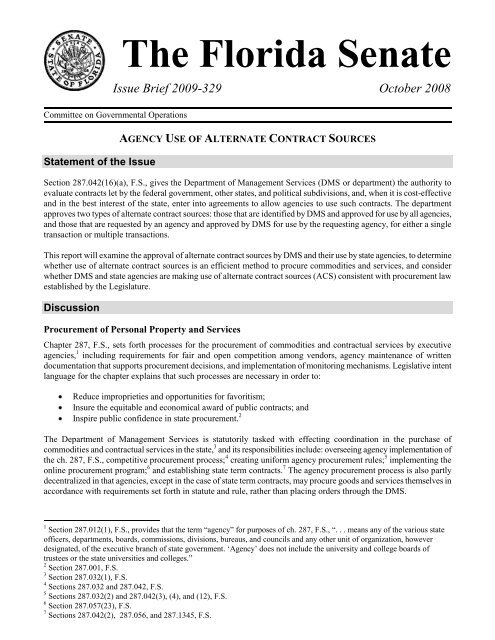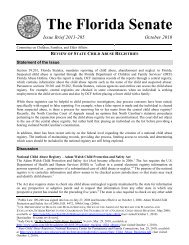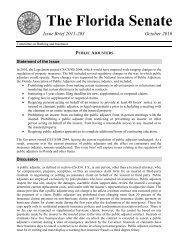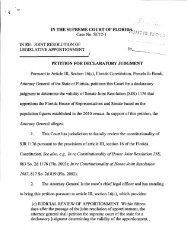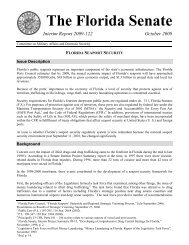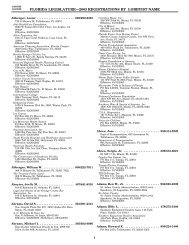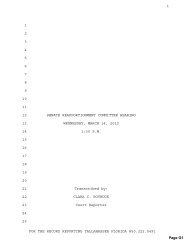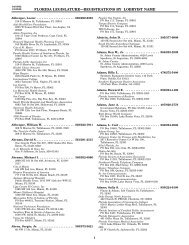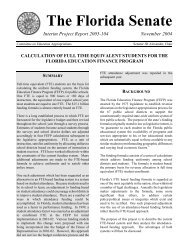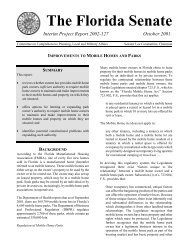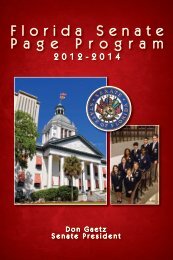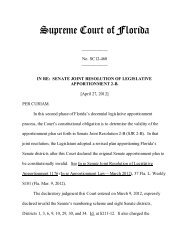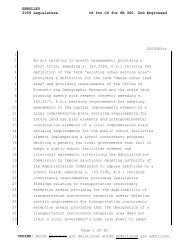Agency Use of Alternate Contract Sources - The Florida Senate
Agency Use of Alternate Contract Sources - The Florida Senate
Agency Use of Alternate Contract Sources - The Florida Senate
Create successful ePaper yourself
Turn your PDF publications into a flip-book with our unique Google optimized e-Paper software.
Page 4<strong>Agency</strong> <strong>Use</strong> <strong>of</strong> <strong>Alternate</strong> Source <strong>Contract</strong>scontract may be with a contracting alliance, consisting <strong>of</strong> multiple state governments that band together, such as theWestern States <strong>Contract</strong>ing Alliance. 23Information related to alternate contract sources requested by agencies is contained in the table below:Initiated by DMS<strong>Agency</strong>-Requested <strong>Alternate</strong> <strong>Contract</strong> <strong>Sources</strong> Reviewed by DMSFiscal Year Requested Withdrawn Denied Approved Estimated <strong>Agency</strong> Spend2007-08 29 2 4 23 $ 14,347,5612006-07 36 7 3 26 $ 10,436,4152005-06 59 14 13 32 $ 11,612,5712004-05 19 1 4 14 $ 2,439,898<strong>The</strong> department may also independently identify term contracts or requirements contracts awarded by othergovernmental entities, and approve such alternate contract sources for use by agencies. As <strong>of</strong> July 28, 2008, DMSdesignated eleven alternate contract sources available for use by agencies, 24 through which agencies spentapproximately $305 million in Fiscal Year 2007-08. 25Mandatory or Optional <strong>Use</strong><strong>The</strong> section <strong>of</strong> the <strong>Florida</strong> Statutes giving DMS the authority to approve an alternate contract source 26 is silent as towhether, once approved, the ACS must be used by agencies. However, s. 287.056(1), F.S., provides that “[a]genciesshall, and eligible users may, purchase commodities and contractual services from purchasing agreements establishedand state term contracts procured, pursuant to s. 287.057, by the department.” Every noun in this subsection is definedin s. 287.012, F.S., except “purchasing agreements.” If an alternate contract source is considered a “purchasingagreement,” a plain reading <strong>of</strong> the statute would appear to require their use by agencies, without exception. 27In the administrative rule on alternate contract sources, DMS does not address whether the use <strong>of</strong> DMS- initiatedalternate contract sources is mandatory or optional. 28 DMS appears to believe it has the authority to deem use <strong>of</strong> anACS as either mandatory or optional. 2923 Though s. 287.042(16)(a), F.S., does not specifically name public contracting alliances as potential suppliers <strong>of</strong> alternatecontract sources, if such alliances consist <strong>of</strong> governmental entities otherwise named in the statute, using their contracts isprobably within the authority granted in the statute.24 <strong>The</strong> contracts include: Vehicle Lifts and Related Garage Equipment; WSCA: Sprint-Nextel; US Communities: GTSI andTech Depot; BMC S<strong>of</strong>tware Distribution, Inc.; IBM S<strong>of</strong>tware; Data at Rest Encryption; GSA Schedule 70; Defibrillators,Related Equipment and Supplies; Office and Classroom Supplies; IT Research and Advisory Services; and HazardousIncident Response Equipment.25 Email from DMS dated September 23, 2008. Most <strong>of</strong> this spend went through two contracts: the US Communities OfficeDepot alternate contract source has a spend <strong>of</strong> about $40 million per year, and the Pharmaceutical Purchasing Programthrough the Minnesota Multi-state <strong>Contract</strong>ing Alliance for Pharmacy (MMCAP) has a spend <strong>of</strong> about $235 million per year.As <strong>of</strong> September 23, 2008, the MMCAP contract was designated by State Purchasing as a state term contract, though it isunclear what statutory authority DMS relied on to do so. DMS has subsequently indicated that the MMCAP contract is analternate contract source, not a state term contract.26 Section 287.042(16)(a), F.S.27 Section 287.056(2), F.S., does give agencies the option to use state term contracts, if a STC contains a user surchargepursuant to s. 287.1345, F.S. In practice this exception has been nullified, and subsection (2) is obsolete, because DMS nolonger utilizes the user surcharge, which has been replaced in operation by the My<strong>Florida</strong>MarketPlace transaction feeauthorized by s. 287.057(23), F.S.28 See Rule 60A-1.047, F.A.C., which largely addresses the process by which an ACS is approved by the department.29 DMS‟ draft white paper on use <strong>of</strong> state term contracts, state purchasing agreements, and alternate contract sources,provided by DMS on August 25, 2008.
<strong>Agency</strong> <strong>Use</strong> <strong>of</strong> <strong>Alternate</strong> Source <strong>Contract</strong>s Page 5Presumably, DMS would rely on Rule 60A-1.044, F.A.C., for the proposition that DMS can deem use <strong>of</strong> an ACS asoptional. Because DMS appears to believe it has authority to make its contracts optional use, a discussion <strong>of</strong> this rule isin order. <strong>The</strong> rule purports to provide circumstances under which use <strong>of</strong> a state term contract is not mandatory:When the purchase amount is less than $250 or any threshold amount established in the STC.When the agency determines that the contract will not meet its need.When the contract expressly designates that it is a non-exclusive contract. 30DMS‟s statutory authority for these exceptions is unclear, though the rule cites s. 287.042(12), F.S., as authority. Thatsubsection provides that DMS may, except as otherwise provided herein, adopt rules necessary to carry out thepurposes <strong>of</strong> s. 287.042, F.S., including the authority to delegate to any agency any and all <strong>of</strong> the responsibilityconferred by the section, retaining to the department any and all authority for supervision there<strong>of</strong>. [Emphasis added.]Not only does s. 287.042(12), F.S., appear to lack any specific authority giving DMS the power to authorize exceptionsto mandatory use <strong>of</strong> state term contracts, the rule appears to directly contradict the plain language in s. 287.056(1), F.S.,which requires agencies to purchase from state term contracts procured by DMS. <strong>The</strong> Joint Administrative ProceduresCommittee, by letter to DMS dated September 5, 2008, requested that DMS provide the specific section <strong>of</strong> the <strong>Florida</strong>Statutes that authorizes DMS to create the exceptions in Rule 60A-1.044, F.A.C. 31State agency purchasing directors who responded to a brief survey opined almost unanimously that use <strong>of</strong> an alternatecontract source established by DMS is always optional, and never mandatory.Conclusion<strong>Alternate</strong> contract sources can be a practical tool when used appropriately by state agencies. Such cooperativepurchasing arrangements involve relatively minimal time and resources for DMS to put into place, and because the timeand expense inherent to the public procurement process has been borne by another entity, an ACS can provide goodvalue to an agency. DMS must continue to ensure that only contracts appropriate for use as alternate contract sourcesare considered for approval, so that an ACS is substantially the same as the existing contract, and not a significantexpansion beyond the existing contract. 32State statutes can be neither ignored nor overwritten by agency policies. DMS and state agencies should review theirpolicies and procedures in reference to s. 287.056(1), F.S., to ensure they are complying with statutory procurementlaw. If current statutes do not provide the flexibility DMS and state agencies need to use approved contracting methodsto achieve best value for the state, the Legislature can consider and enact changes to Chapter 287, F.S.30 Rule 60A-1.044(3), F.A.C.31 DMS also issued State Purchasing Memorandum No.2 (2003-04), describing the use <strong>of</strong> state purchasing agreements, whichdeclares that “state agencies are not required to use the State Purchasing Agreement.” This statement appears to meet thedefinition <strong>of</strong> a rule in s. 120.052(12), F.S., (“‟rule‟ means each agency statement <strong>of</strong> general applicability that implements,interprets, or prescribes law or policy or describes the procedure or practice requirements <strong>of</strong> an agency…”). Not only doesthis appear to be a rule not adopted pursuant to the Administrative Procedure Act, but it also appears to directly contradict theplain language <strong>of</strong> s. 287.056(1), F.S. (“agencies shall…purchase from purchasing agreements established…by thedepartment.”), assuming “purchasing agreement” in s. 287.056(1), F.S., includes a “state purchasing agreement” establishedby DMS.32 <strong>The</strong>se standards are suggested by the court in Accela v. Sarasota County, at 6.


